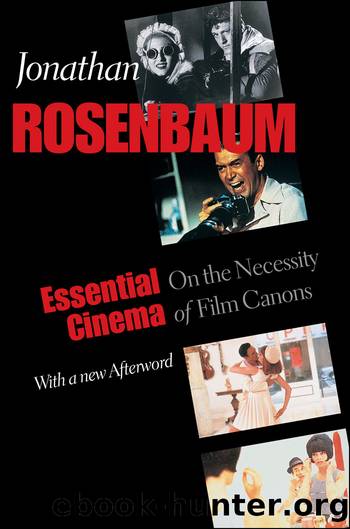Essential Cinema : On the Necessity of Film Canons (9780801895142) by Rosenbaum Jonathan

Author:Rosenbaum, Jonathan
Language: eng
Format: epub
Publisher: Johns Hopkins Univ Pr
Published: 2004-06-15T00:00:00+00:00
International Sampler
Ghost Dog: The Way of the Samurai
Jim Jarmuschâs seventh narrative feature, Ghost Dog: The Way of the Samurai, may be a failure, if only because most of its characters are never developed far enough beyond their mythic profiles to live independently of them. But if it is, itâs such an exciting, prescient, moving, and noble failure that I wouldnât care to swap it for even three or four modest successes.
Compared with a masterpiece like its controversial predecessor, the 1995 Dead Man, Ghost Dog seems designed to get Jarmusch out of the art-house ghetto, at least in this country, and into something closer to the mainstream. Itâs full of familiar elements reconfigured in unfamiliar ways: Ghost Dog (Forest Whitaker), whose life was once saved by Louie, a New Jersey hoodlum, becomes Louieâs samurai hit man, communicating with him exclusively via homing pigeons. When something goes wrong during a hit, Louieâs gang decides to wipe out Ghost Dog, who retaliates in order to defend himself.
Like Dead Man, Ghost Dog is far more ambitious than any of Jarmuschâs earlier works. Both films still bear traces of his origins as a New York minimalist, but Jarmusch has introduced historical referencesâa sense of antiquity and tradition treated with genuine gravity and an expanded sense of time to match his well-developed sense of geographical spaceâthat have opened up his imagination and extended his thematic and affective range well beyond that of his first five features.
Some of this sense of history comes through literary references. There were brief references in some of the earlier films, such as those to Chaucer and his Canterbury Tales in Mystery Train, but the references in Dead Man and Ghost Dog are crucial. The key texts in Ghost Dog are Yamamoto Tsunetomoâs Hagakure: The Book of the Samurai (an eighteenth-century warrior text), Ryunosuke Akutagawaâs Rashomon and Other Stories (an early-twentieth-century collection), Mary Shelleyâs nineteenth-century Frankenstein, and an undated French book about bears. These books are as important as the quotations from William Blakeâs poetry in Dead Man, because they offer various kinds of life lessons and because, in one way or another, theyâre shared by two or more characters and thus become touchstones. Moreover, with the exception of the Akutagawa collection, which circulates the most, all of them can be regarded as books about the movieâs title hero. Indeed, Hagakure serves as Ghost Dogâs Bible and is quoted in the film in extended intertitles no less than thirteen times; the first twelve passages are read aloud by Ghost Dog, whoâs offscreen, and the final passage is read aloud by Pearline, a little girl he meets in a park.
Some viewers have been irritated by all these quotations, and thereâs no question that each of them stops the story dead in its tracksâparadoxically, at the same time it offers interpretive commentary on whatâs going on. The quotes remind me of a rather obscure fantasy tale of the 40s by Lewis Padgett (the most frequent pen name of Henry Kuttner), âCompliments of the Author,â
Download
This site does not store any files on its server. We only index and link to content provided by other sites. Please contact the content providers to delete copyright contents if any and email us, we'll remove relevant links or contents immediately.
| Coloring Books for Grown-Ups | Humor |
| Movies | Performing Arts |
| Pop Culture | Puzzles & Games |
| Radio | Sheet Music & Scores |
| Television | Trivia & Fun Facts |
The Kite Runner by Khaled Hosseini(5170)
Gerald's Game by Stephen King(4642)
Dialogue by Robert McKee(4390)
The Perils of Being Moderately Famous by Soha Ali Khan(4217)
The 101 Dalmatians by Dodie Smith(3506)
Story: Substance, Structure, Style and the Principles of Screenwriting by Robert McKee(3463)
The Pixar Touch by David A. Price(3431)
Confessions of a Video Vixen by Karrine Steffans(3303)
How Music Works by David Byrne(3262)
Harry Potter 4 - Harry Potter and The Goblet of Fire by J.K.Rowling(3063)
Fantastic Beasts: The Crimes of Grindelwald by J. K. Rowling(3055)
Slugfest by Reed Tucker(2998)
The Mental Game of Writing: How to Overcome Obstacles, Stay Creative and Productive, and Free Your Mind for Success by James Scott Bell(2904)
4 - Harry Potter and the Goblet of Fire by J.K. Rowling(2700)
Screenplay: The Foundations of Screenwriting by Syd Field(2637)
The Complete H. P. Lovecraft Reader by H.P. Lovecraft(2557)
Scandals of Classic Hollywood: Sex, Deviance, and Drama from the Golden Age of American Cinema by Anne Helen Petersen(2520)
Wildflower by Drew Barrymore(2486)
Robin by Dave Itzkoff(2438)
